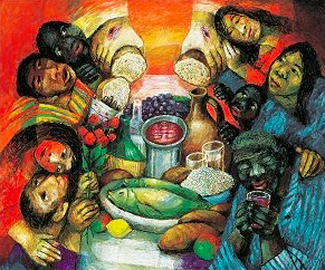 III. Above all this scene reminds us as a gathered-church, we are wholly at odds with Caesar and all the powers—the tables are turned The final of the three Pilate-questions that occupy our attention comes after Pilate could find no guilt in Jesus, “Shall I crucify your King?” This question sets up the statement of all adamic statements: “We have no king but Caesar!” The Jewish leaders themselves had become frustrated with Pilate and, so, had turned to the clincher of their argument for doing away with this Jesus--they made it all about Caesar. They do what the world always does: they change the characters in the judgment hall. They put Pilate before Caesar rather than Jesus before Pilate. The Jews set Pilate up, for when “Pilate sought to release him” (19:12), the Jews cried out, “If you release this man, you are not Caesar’s friend. Everyone who makes himself a king opposes Caesar.” And in their last breath, the words that confront us all, Pilate was done—out-done: “We have no king but Caesar!” The ironic thing, the Jewish leaders didn’t want to defile themselves by going into Caesar’s Jerusalem judgment hall, yet they had carried Caesar in their hearts, leaving them most defiled and guilty at their very core before God. As he had tracked the Jewish leaders and Pilate down to that very moment, Jesus puts every listener of this story, us all, on trial. Who is your king? But I don’t want to leave this here before the individual—which of course each of you, each of us must decide who is our king? —but I think we need to go right to the listeners of this in its original setting and see how this all works for church, for a gathered-church. This scene parallels the apostolic and early church’s social-religious-political-civil setting—as Jesus was on trial, so is the gathered-church—not just for judgment, but to affirm their allegiance, for encouragement, despite all appearances to the contrary, Jesus is king! As I said already, this scene is good news to the church!
The gospel shaped gathered-church is not simply one of social integration, but is a scandal to any human institution that systemizes tiers of human hierarchies, be it social, civic, or religious. More than simply a model, everything about the early, locally gathered-churches challenged the empire, the temple-cults, the religious and political establishment, the business world, and, supremely, all human relationships.
Celsus, the second century critic of Christianity, described the spread of Christianity as a religion of “slaves, women and little children,” a warning and an argument against the church, for it disrupted the status quo ordering of life. It was “unlikely that Celsus would have thought the Christians worth his notice had he not recognized something uniquely dangerous lurking in their gospel . . .” These gathered-churches were made up of unequals and strangers. Their gatherings were seditious and dangerous at two levels: social (the leveling of social status) and empire (another king). Their presence, like no other, threatened to destabilize all of society. It is no shock, then, that the church was scorned and persecuted. Yet, the church lived in the tension and conflict differently (than other rebellious sects and groups) . Like Jesus and his kingdom, the church will not be defended (or grow) by the world’s means. By any form of violence or appeal to power. Yet, we turn too often to the powers to get our way, to defend our plot of ground, to promote our agenda—way too close to the duplicitous Jewish leaders’ use of Caesar’s power through Pilate. The very opposite of Jesus before Pilate. The Ephesus church would later hear from the Apostle Paul that the gathered-church's fight is not against blood and flesh, but against the spiritual powers in the heavenly places (6:12) . . . our struggle is always to keep Jesus before our accusers and we must stop making our gospel, our stake of ground, our values a fight between our neighbors and Caesar.
You see, this cup would have been raised throughout the Roman Empire at this time, at every household supper gathering (an evening household banquet, if you will) . . . this is where the church would have declared openly, in front of each other and guests and onlookers (remember, the uninvited would crowd around these suppers to see what's happening)—this is where they would risk everything, set things right, and declare that they had no king but Jesus!
[1] David Bentley Hart, Atheist Delusions: The Christian Revolution and Its Fashionable Enemies (New Haven: Yale University Press, 2009), 167. *This message was originally delivered at Christ Presbyterian Church Fairfield and Christ Presbyterian Church in The Hill.
0 Comments
Your comment will be posted after it is approved.
Leave a Reply. |
AuthorChip M. Anderson, advocate for biblical social action; pastor of an urban church plant in the Hill neighborhood of New Haven, CT; husband, father, author, former Greek & NT professor; and, 19 years involved with social action. Archives
February 2024
Categories
All
|
Pages |
More Pages |
|
 RSS Feed
RSS Feed